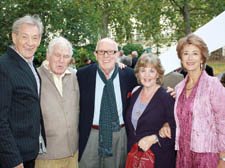|
|
 |
| |

Mr Roose-Evans with actors Sir Ian McKellen ,Richard Wilson, Pauline Collins and Maureen Lipman |
Golden boy of a theatre treasure
50 years on, Gerald Isaaman recalls the launch of the Hampstead Theatre Club and looks at the odyssey of the man who drove the creative enterprise to fruition
Opening Doors and Windows: A memoir in Four Acts
by James Roose-Evans.
The History Press £18.99
IT happened on my doorstep. So it was inevitable that the birth of the Hampstead Theatre Club should make page 1 headlines in the Ham and High back in 1959, four years after I arrived as a junior reporter.
That was because the enterprise was launched by James Roose-Evans from a tiny bow-fronted cottage in Perrins Court, within yards of the somewhat ancient rotary press that splashed the news that a brave new venture, to emulate the Everyman Theatre, where Noel Coward first won fame, was about to take off.
And what better place than the Moreland Hall, bang next door to the 1920s avant garde domain of Norman MacDermott that lasted but six years, whereas the Hampstead Theatre, now in its purpose-built Swiss Cottage venue, celebrates its golden curtain up anniversary today (Thursday).
So it is inevitable too that the enthralling story of those fractious early years, without any public grant, forged with passion, vision and tenacity, should form one act in the life of Roose-Evans that he so eloquently tells in his memoirs.
Not that the initial theatre idea came directly from Roose-Evans, now coming up for 82. The question of a new theatre for artistic Hampstead was posed by his friend, the playwright William Ingram, whose own play The Rain It Raineth made its debut at the Moreland Hall.
That production receives no mention, but such minor omissions are no doubt due to the slashing of the original manuscript of 110,000 words to an economic 80,000.
That doesn’t detract from the overall impact of an uplifting book, itself a vivid drama that has an embracing value and the delight of fun and famous names. For it is the story of the hesitant search for creative love and spiritual satisfaction against the grinding complexities of life’s mean cruelties.
In those early years, ebullient Jimmy just couldn’t fail as he busked outside the Everyman to raise funds and knocked on the doors of the rich, such as the admirable Max Rayne, with a begging bowl.
He was 29, handsome, with a compelling voice that charmed all objections off stage. And he engaged the talents of unknown playwrights such as Harold Pinter, whose early success with a one-act double bill in the draughty Moreland Hall, together with the revival of Coward’s Private Lives, set the splendid course for the Hampstead Theatre’s past 50 years.
It sent Roose-Evans off on new adventures as a director in the West End with the award-winning adaptation of 84 Charing Cross Road, as a writer, especially his Odd and Elsewhere children’s books, and as a gay man who converted from Catholicism to become a roving Church of England priest.
He was the founder too of the Bleddfa Centre for the Creative Spirit, tucked away in the silent and beautiful Welsh marches, where he perfected the meditative process that has controlled his anger. Some aspects he hid for fear of controversy. Indeed, his ordination in Hereford Cathedral only became known because the late Lord Beaumont, the Liberal peer and priest, who lived in Hampstead, discovered the fact on a visit to Hereford and phoned me in amazement.
Yet the past perils of homosexuality, probably thanks to the generosity of the world of theatre – and NW3 too – have hardly caused any difficulties for Roose-Evans during his fascinating career and long life in Belsize Park Gardens with his partner, Hywel Jones.
Yet this is the saga too of a vulnerable man who set his sights on becoming a great actor while – as actors often are – a shy, sensitive soul. It is the early years that demanded my attention in this essential memoir.
Roose-Evans considered himself the outsider, painting a pathetic picture of himself standing like a caged animal in the gay William lV pub in Hampstead, seeking attention.
What I enjoyed were the tales of busking outside West End theatres to earn the price of a ticket to see some play, his attempt to become a monk and falling in love while at Oxford, his first encounters in the theatre, developing and teaching his experimental ideas in New York and at RADA, until we reach the Hampstead stage.
You only have to read of his encounters with Martha Graham, John Gielgud, Robert Frost, Eleanor Farjeon, and Tennessee Williams to feel the spirits rise under the spell of the shaman – and make you realise here is an exceptional man. Bravo, as they say in the theatre. |
 |
|
|
 |
 |
|
 |
|


